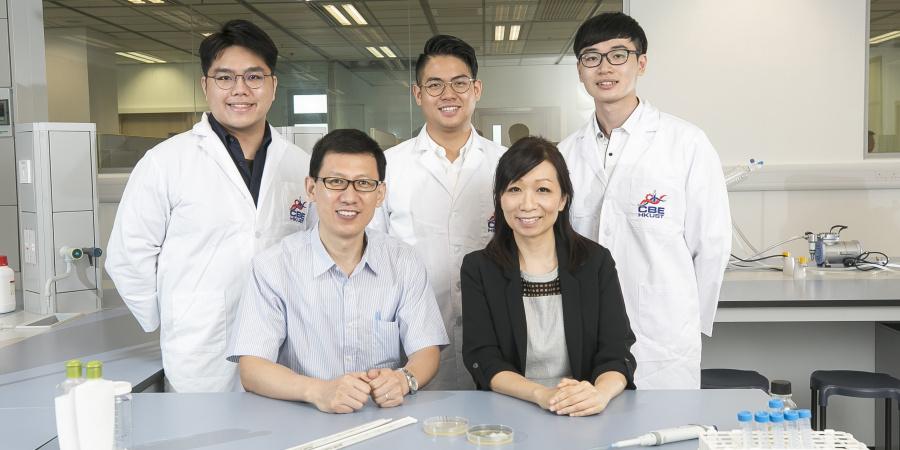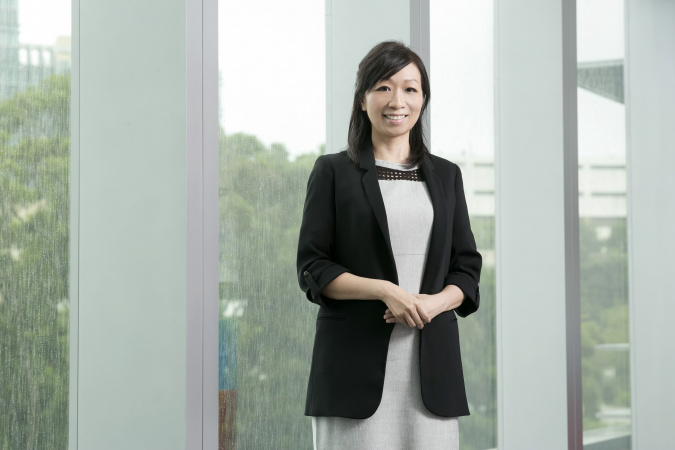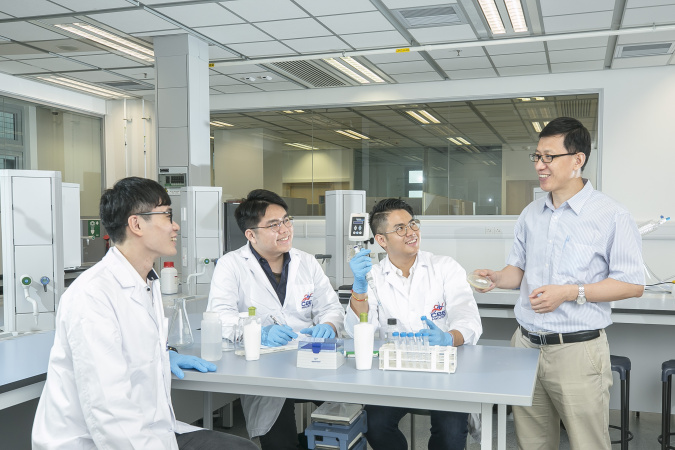Chemical and Biological Engineering Alumna, Students and Faculty Join Hands in Product Commercialization
Alumna Vanessa HO Po-Ki (1998 BEng in Chemical Engineering) had never met Prof. Marshal LIU of the Department of Chemical and Biological Engineering (CBE) while she was at university 20 years ago. The cordial relationship the two have forged is a testament to the strength of the alumni network that not only establishes friendship among students, alumni and faculty members across generations, but also helps them accomplish new milestones in their careers and contribute to society.
Marshal has long admired Vanessa for her success as an entrepreneur. “Even before I met her in person, I used her inspiring story in my classes several times,” he says with a laugh, going on to appreciate her support to the department and the university, over and above her vision and sharp business sense.
“When I brought up the idea of a sanitizing hand cream that three CBE final year students of the Product and Process Design course had developed, Vanessa readily agreed to explore the commercialization of the product.” Throughout her eventful entrepreneurial journey, Vanessa has been very adept at grasping the opportunities that have come her way.
Early steps to success
Invited by Marshal to share her story, Vanessa grins and begins with why she chose engineering. “I loved chemistry but didn’t want to stay in a laboratory running experiments every day, so I chose chemical engineering, focusing more on applications. HKUST is the only university that offers this program in Hong Kong.” Looking back, this proved to be a wise choice.
Vanessa graduated in 1998, just as the CD-R industry emerged. At that time, many of her classmates joined CD-R production factories, and she became aware of the substantial demand for solvent. “I made a long-distance call to Taiwan and invested HK$20,000 to order the first shipment,” Vanessa recalls.
Her first golden opportunity came when, just after she established her company and the shipment of solvent arrived, Taiwan was hit by an earthquake, and other suppliers’ orders could not reach Hong Kong. “Since CDs cannot be produced without this raw material, all these customers suddenly had only my company to turn to.”
How Vanessa took her business forward is a textbook lesson in entrepreneurship. She quickly realized that her supplier in Taipei had a successful model: the supplier was the sole agent who procured a solvent from the United States and supplied it to drug manufacturers and laboratories. Inspired, she was determined to attempt to become the producer’s sole agent in Hong Kong and went to the United States three times to make her case in person.
“When they saw me, they questioned the capability of a 23-year-old woman,” she says. But perhaps the American solvent manufacturer was moved by her ambition because she was granted sole agent status, beating her competitors in Hong Kong and building up a robust customer base.
Seizing the opportunity
Vanessa did not rest on her laurels. To source the solvent at a lower price, she ventured into Mainland China and invested in a chemical plant in Shandong province in 2001, where she installed her own distillation column. She describes this as a true turning point in her career.
“In 2003, when the trend globally was moving from CD-R to DVD-R, a key worldwide solvent supplier from Japan had a fire in one of its factories, and was unexpectedly unable to resume production for over a year. There was a global shortage of solvent, increasing the selling price tenfold.”
Suddenly, her company was flooded with orders. “I looked for diluted solvent in the Mainland, purified it using the distillation column and supplied the market. As it turned out, I made a huge profit! I am grateful to my HKUST education for giving me the knowledge that enabled me to adapt.”
Vanessa established Pure Living in 2017, where she serves as Chief Executive Officer. “I wanted to build my own brand,” she explains. She is grateful for the wealth of support that HKUST professors, especially CBE Prof. David HUI, have provided, including guidance on how to apply for government funding and to speed up business development.
Contributing to the fight against COVID-19
Sharing her achievements in the last two decades, Vanessa says frankly that COVID-19 brought her the greatest challenges she ever experienced. “At the beginning of the epidemic, many long-standing pharmaceutical clients said their employees could not work due to the lack of masks. They thought maybe I could help, but in fact I had no way to source masks because of the global shortage.”
She decided to produce surgical masks herself, but found herself facing the biggest hurdle of her life. From acquiring a mask production machine to developing meltblown fabric, every step has been like riding a roller-coaster.
“Because of my grounding in the chemical industry, I followed all the specs rigorously. But I was unable to buy quality-guaranteed meltblown fabric. I could not bear to destroy our established brand reputation,” Vanessa says with wry smile. “Therefore, we were forced to produce even the meltblown cloth ourselves.” She thanks HKUST professors, including Marshal, for sharing his expertise and helping the company finally build its own machine.
Despite these challenges, Vanessa has remained a perfectionist. “By the time I could manufacture a product I was satisfied with, the market was almost saturated and the price had dropped sharply. Although we were only able to break even, more importantly, it establishes the company’s brand image and lets people know what our industry has done for society and Hong Kong during this difficult time.”
It is also a demonstration of her motto: “Don't be afraid of falling down, be conscious when you are at your peak, always be attuned to the possibility of a crisis, and be prepared to cope with adversity.”
Now that fighting the pandemic has become the public’s first priority, her company will continue to focus on anti-pandemic products. Therefore, when Marshal enthusiastically recommended his students and their sanitizing hand cream to her, she was determined to explore the idea.
“Some people are sensitive to ethanol, but protection from bacteria and germs is critical. A hand cream that can sterilize and protect would be very useful. At first, I was doubtful, but after the sample was tested and proved effective, we decided to manufacture the product.”
Support of the alumni network
Both Vanessa and Marshal are firm believers in the importance of the alumni network. “While the professors here offer support and provide many new ideas on R&D, our experience running businesses means we can screen whether products can be launched in the market,” Vanessa says.
She treasures students from her alma mater. “We can find good people faster and easier as teachers recommend high-caliber graduates to us. I always give those from HKUST the first priority, which is a good loop.”
For Marshal, who actively connects with alumni, the network is vital. “Alumni can mentor students, help with career development and offer them internships, co-ops and employment opportunities. Many of our alumni are role models for our students. They are dedicated to their careers as professionals and making significant contributions.”
He is filled with tremendous satisfaction when he sees collaborations between alumni and students result in fruitful achievements. “Hopefully, Vanessa will have a good return on her investment.”
He cites an example to highlight the importance of the alumni network. “Knowledge transfer and product commercialization need expertise, capital, manpower and management. All these resources may not be easily available from just cold calls. Through the department and alumni network, alumni, faculty and students can quickly join hands because of mutual trust.”
Related link:
- SENG news (Oct 27, 2020): The “Design Come True” Experience of Developing Antimicrobial Hand Cream



